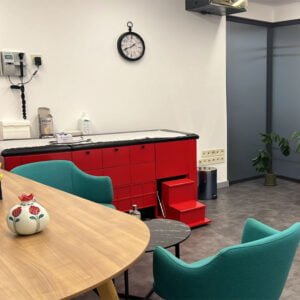This website uses cookies so that we can provide you with the best user experience possible. Cookie information is stored in your browser and performs functions such as recognising you when you return to our website and helping our team to understand which sections of the website you find most interesting and useful.
Food Allergy Treatment
- Home
- Food Allergy Treatment

All Inclusive Package Details
5 Star Accommodation
Transfer Services
Hospital
Expert Allergy Doctors
Why Should You Choose Us?
Founded in 2022, CURExplore is a service provider that brings together guests from abroad through medical staff and translators who can speak their own language.
CURExplore, which organizes international patients from all over the world, mostly from Europe to Turkey, is an Istanbul-based health tourism intermediary company that is a member of TURSAB (Association of Turkish Travel Agencies) with the code 14076 and has the Ministry of Health Accreditation.
30-minute free consultation.
After free online consultation, we determine your needs and plan your operation free of charge.
No Surprise Costs
We will not charge you any additional fees.
All Inclusive Packages
5-Star Accommodation, Transfer, Post-Operative Care at the Hotel, Translator, All Processes with You
Fill Out the Form and Get a Personalized Quote
Address
Küçükbakkalköy neighborhood. Merdivenköy Yolu neighborhood. No:12/1 Ataşehir / İstanbulContact Form
Frequently Asked Questions on Food Allergy Treatment
A food allergy is an extreme immune system reaction of the body to certain foods. The body mistakenly perceives these normally harmless foods as a threat and activates defense mechanisms against allergens. This reaction usually occurs immediately or within a few hours after consuming the allergenic food.
Symptoms of food allergy can vary from person to person and can range from mild to severe. Allergic symptoms can start within a few minutes or an hour after eating the food. Skin reactions such as eczema, urticaria (hives), itching, redness and swelling are common. Such symptoms may occur around the mouth, face or other parts of the body.
Abdominal pain, nausea, vomiting, diarrhea and digestive problems are common symptoms of food allergy. Respiratory reactions such as shortness of breath, coughing, wheezing, runny or stuffy nose and itchy or swollen throat may occur.
Anaphylaxis is the most serious and life-threatening reaction to food allergies. It is a generalized allergic reaction in the body and can lead to severe shortness of breath, low blood pressure, fainting and even death. Anaphylaxis is a condition that requires urgent medical attention.
Other general symptoms such as dizziness, weakness, rapid pulse can also occur with food allergies. If you experience or observe symptoms of food allergy in your child, it is important to contact a healthcare professional. Allergy tests and appropriate medical evaluation are essential for proper diagnosis and treatment.
Your body's immune system fights against infections and other dangers to keep you healthy. When your immune system recognizes that a food or something in a food is "dangerous" to your health, you have a food allergy reaction. This condition is often linked to genetic factors, so if you have a family history of allergies, you may be at higher risk of developing food allergies. Environmental factors are also important. Children who grow up in very hygienic environments may become hypersensitive to certain foods because their immune system is not exposed to a variety of germs. Dietary habits can also play a role. For example, lack of exposure to certain foods at an early age may increase the risk of developing allergies to those foods in the future.
Other factors may also play a role in the development of these allergies. For example, some people may develop allergies to certain food additives or preservatives. In addition, the general state of the immune system and health conditions can also influence the development of allergies.
Diagnosis of a food allergy is usually carried out in several different ways. The first step is usually a detailed medical history and examination of symptoms. The doctor will carefully examine the patient's reactions to food and the timing of these reactions. This gives an idea of which foods may be problematic.
Allergy tests, such as a skin prick test or blood tests, can then be performed. A skin prick test involves applying a small amount of a potential allergen to the skin and watching for a skin reaction. Blood tests measure the presence of antibodies to specific allergens in the blood.
Sometimes, doctors may recommend keeping a diet diary to find out if a food is causing an allergic reaction. This helps you better understand which foods are causing symptoms.
In some cases, an oral food allergy test (oral food challenge) may be performed. This test involves slowly consuming the suspect food in a controlled environment and observing any reaction. This test is often used as a last resort when other tests do not give a clear result.
Treatment of food allergies varies depending on the type and severity of the allergy. Currently, there is no definitive cure for most food allergies. Instead, treatment usually focuses on avoiding the allergy-causing foods and managing the reactions that can occur if they are inadvertently consumed.
The most common approach is to eliminate allergy-causing foods from your life. If an allergenic food is accidentally consumed, different treatment methods can be used depending on the severity of the reaction. Mild reactions can usually be treated with antihistamines. However, in the case of a severe allergic reaction (anaphylaxis), it is vital to seek emergency medical help immediately and get an injection of epinephrine (adrenaline). If you only have symptoms on one part of the body (for example, a rash on the chin after eating food), you may not need any treatment. The symptoms will probably go away soon.
In recent years, special treatments for some food allergies have been developed, such as oral immunotherapy for peanut allergy. These treatments aim to gradually increase the tolerance of allergic people to allergens. However, such treatments can only be used under the supervision of a doctor and under certain conditions. If you suspect that you or your child has a food allergy, we recommend that you consult an allergist.



























